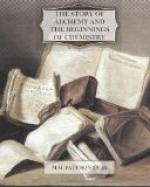For the undefined, ever-changing, protean essence, or soul, of a thing which the alchemists thought of as hidden by wrappings of properties, the exact investigations of Lavoisier, and those of others who worked on the same lines as he, substituted this definite, fixed, unmodifiable property of mass. Lavoisier, and those who followed in his footsteps, also did away with the alchemical notion of the existence of an essential substratum, independent of changes in those properties of a substance which can be observed by the senses. For the experimental researches of these men obliged naturalists to recognise, that a change in the properties of a definite, homogeneous substance, such as pure water, pure chalk, or pure sulphur, is accompanied (or, as we generally say, is caused) by the formation of a new substance or substances; and this formation, this apparent creation, of new material, is effected, either by the addition of something to the original substance, or by the separation of it into portions which are unlike it, and unlike one another. If the change is a combination, or coalescence, of two things into one, then the mass, and hence the weight, of the product is equal to the sum of those masses, and hence those weights, of the things which have united to form it; if the change is a separation of one distinct substance into several substances, then the sum of the masses, and hence the weights, of the products is equal to that mass, and hence that weight, of the substance which has been separated.
Consider the word water, and the substance represented by this word. In Chapter IV., I gave illustrations of the different meanings which have been given to this word; it is sometimes used to represent a material substance, sometimes a quality more or less characteristic of that substance, and sometimes a process to which that substance, and many others like it, may be subjected. But when the word water is used with a definite and exact meaning, it is a succinct expression for a certain group, or collocation, of measurable properties which are always found together, and is, therefore, thought of as a distinct substance. This substance can be separated into two other substances very unlike it, and can be formed by causing these to unite. One hundred parts, by weight, of pure water are always formed by the union of 11.11 parts of hydrogen, and 88.89 parts of oxygen, and can be




